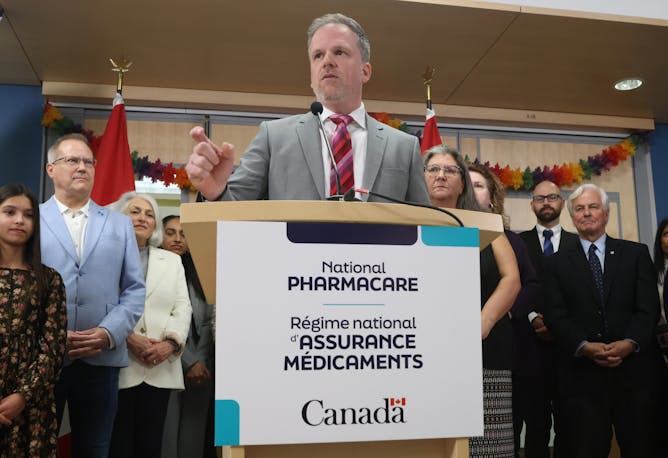|
|
|
|
Are you a read-before-watching kind of TV and movie viewer, or do you like to plunge in with both feet unaware? If you’re the latter, and you happened to tune into Netflix’s ‘Baby Reindeer’ before the major buzz, you may have astounded by powerful storytelling that allows ugly and harrowing truths to sneak up on you between moments of laughter and discomfort — not unlike life, sometimes. You may also have felt profoundly unsettled or even ill because of the show’s troubling depictions of rape, assault and exploitation.
Today in The Conversation Canada, Jacob DesRochers of Queen’s University writes about how the show highlights critical issues including sexual violence against men. But, he writes, while the show flags mature themes for viewers, and offers a link to a crisis resource, it’s far from clear that these measures prevent or mitigate secondary trauma in the audience.
“We should rethink how content advisories are used, and whether they truly inform viewers or absolve creators of deeper ethical responsibilities,” he writes. “At the very least, networks might understand that content advisories are an essential accessibility measure in film and television, and also consider how shaping a narrative and editing scenes may partly mitigate potentially harmful depictions.”
Also today:
|

|
Susannah Schmidt
Education + Arts Editor
|
|

Seldom do we see stories on the screen where men are survivors of sexual trauma.
(Netflix)
Jacob DesRochers, Queen's University, Ontario
‘Baby Reindeer’ raises questions about the effectiveness of content warnings. Viewers may still be vulnerable to secondary trauma, particularly those who have experienced similar violence.
|

Minister of Health Mark Holland speaks about new national pharmacare legislation during a press conference in Ottawa on Feb. 29, 2024.
THE CANADIAN PRESS/ Patrick Doyle
Cheryl A. Camillo, University of Regina
The way pharmacare is implemented could contribute to the Canadian health insurance system’s transition toward a more contentious and unequal American-style system with heavy administrative burdens.
|

In honour of National Nursing Week May 6-12, consider asking a nurse about their work life. Demand for nursing services in Canada far exceeds the current supply of nurses.
(Shutterstock)
Lisa McKendrick Calder, MacEwan University; Leanne Topola, MacEwan University; Tanya Heuver, MacEwan University
Surveying more than 5,500 nurses about the realities of their work lives highlights how a shortage of nursing staff could compromise Canadians’ ability to access safe, compassionate care.
|

Social interactions with parents, friends and teachers can have profound impacts on a child’s learning, development and understanding. What if some of those interactions are with AI systems?
(Shutterstock)
Nandini Asavari Bharadwaj, McGill University; Annie Shiau, McGill University
Before charging ahead to a world of AI babysitters and teacher or companion robots, we should consider this technology carefully to assess its appropriateness in children’s lives.
|
La Conversation Canada
|

Le manque de services offerts à nos aînées peut être une source d'inquiétude et de précarité.
(Shutterstock)
Diane Alalouf-Hall, Université du Québec à Montréal (UQAM); Jean-Marc Fontan, Université du Québec à Montréal (UQAM)
Les récentes contractions budgétaires du gouvernement ont obligé les organismes communautaires au service des personnes aînées à solliciter davantage les fondations philanthropiques.
|
Culture + Society
|
-
Matthew Mclaughlin, The University of Western Australia; Chris De Gruyter, RMIT University
The number of deaths on Australian roads has been increasing steadily year after year. It’s unacceptable not to act on the evidence of what works to boost road safety.
|
|
Environment + Energy
|
-
Mohan Qin, University of Wisconsin-Madison
Nanoplastics are the smallest microplastics, far narrower than a human hair. Very little is known about their composition, structure or how they break down in the environment.
|
|
Politics
|
-
Katrina Burgess, Tufts University
Donald Trump says he will authorize a roundup of all 11 million undocumented immigrants in the country. A 1950s program with similar goals, called Operation Wetback, offers lessons.
|
|
|
|
| |
| |
| |

|
| |
| |
| |
| |
| |
| |
|
|
|
|
|
|
|